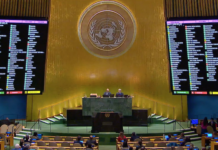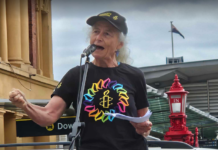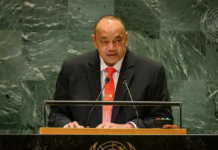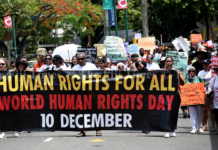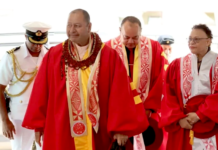
ANALYSIS: By Gavin Ellis, Knightly Views columnist
Sometime this week Newsroom co-editor Mark Jennings is due to be interviewed under caution by the New Zealand police because he kicked the hornet’s nest.
The particular hornet’s nest he disturbed was Oranga Tamariki, a state agency, and the reason it was given a boot was a now-discredited policy called reverse uplifts.
Jennings took editorial responsibility for a series of ground-breaking investigations led by Melanie Reid that including a video documentary containing shocking images of the “uplifting” of a child.

In a story on the Newsroom website last week, co-editor Tim Murphy revealed the police investigation that named Jennings and the demand that he attend the under-caution interview. “Under caution” means that anything he says could be used in a criminal prosecution against him.
The story noted that the case highlighted in the video led directly to Children’s Minister Kelvin Davis seeking a “please explain” from the agency and then directing Oranga Tamariki to stop the new policy of “reverse uplifts’” under which Māori children around the country who had been put in permanent care were being summarily removed and taken, in the case investigated, to unknown and distant whānau.
A Māori advisory panel was appointed from outside the ministry and the chief executive of Oranga Tamariki (OT), Grainne Moss, later resigned.
However, OT did not take the Newsroom investigation on the chin. In fact, it came out fighting and enlisted Crown Law. That intervention led to a High Court order to remove a video from the Newsroom website and the media organisation being hit with a $13,000 costs order it can ill-afford.
Finding may be challenged
The judge in the case did not accept that the matter was of such public interest that it over-rode the (strongly contested) matter of potential identification. While I accept that the identity of vulnerable persons must be protected under both the Family Court Act and the Oranga Tamariki Act, it remains to be seen whether that finding against Newsroom will be challenged. My own – strictly layman’s – view is that it could be.
Now one of Newsroom’s most senior executives is being threatened with criminal prosecution under the Family Court Act. Jennings could face up to three months in prison or a maximum fine of $2000 under that legislation. Arguably, he might even face a charge of contempt of court which can carry up to six months imprisonment or a $25,000 fine.
My question is a simple one: Why?
Why was Crown Law asked to intercede on Oranga Tamariki’s behalf? Why was an injunction sought in spite of Newsroom’s willingness to take steps to avoid identification of children? Why, after the initial aim of removing the video had succeeded, was an order for costs pursued against a fledgling news organisation struggling to maintain financial viability? Why have the police now been involved to pursue a criminal investigation against one of its co-founders? And why has this whole matter been pursued with such vigour?
My own view is that Newsroom’s investigation was very much in the public interest and that the video was a critical element in bringing about a policy change. I thought the possibility of identifying the children was remote.
Collectively, my questions have a simple answer: To send a message that, if you kick a state agency’s hornet’s nest, expect to get stung.
In legal and media circles it has a name: The Chilling Effect. It’s a concept that has been around for a long time.
Sedition laws as punishment
One of America’s founding fathers, James Madison, had real concern during the framing of the Constitution of the United States over the use of sedition laws to punish those who criticised government. Madison rightly concluded that it would lead to an author thinking twice before publishing and create a form of self-censorship.
And so it does.
In 2015 I swore an affidavit in support of Nicky Hager’s action against the Police when they executed a search warrant on his home following publication of Dirty Politics. It was one of three affidavits on the nature of the chilling effect that searches for the identity of confidential sources would have on investigative journalism.
Justice Clifford acknowledged the possibility of a chilling effect and noted that the three statements on its nature and consequence went unchallenged by the Attorney-General’s counsel. Of course, Hager won that challenge, and one might have thought Police would have become more than a little reticent about actions against journalists and their lawful pursuits.
It is doubtful that Crown Law acted against Newsroom of its own volition. It is far more likely that Oranga Tamariki arrived on its doorstep complaining that poor children were being identified and “something has to be done”. OT had genuine concerns for these tamariki and children in general, but there is no doubt its reputation had been damaged by the Newsroom investigations.
The lengths that it has been prepared to go in pursuing Newsroom – in the complete absence of any complaint to the news organisation by any member of the public over possible identification of the children or their whanau –is nonetheless puzzling.
Put simply, there is no evidence that children or whanua have been publicly identified and, in any event, Newsroom has had the publication of that particular part of its investigation banned. It has also incurred a very substantial financial penalty with the awarding of full costs.
A clear warning
Assuming the police action stems from a complaint emanating from OT, I am left with a nasty feeling that the result is a clear warning about delving too deeply into the agency’s activities. In other words: Don’t kick the hornet’s nest!
It has a chilling effect that extends beyond OT. What is to stop other state agencies from threatening criminal charges if they can find a convenient piece of law?
Convenient laws can be found in unlikely places. Twenty years ago, the British government tried to use the Treason Felony Act of 1848 to hammer The Guardian. The Act contained a clause making it unlawful to call for an end to the monarchy.
Editor Alan Rusbridger was on a republican campaign when he got hit from behind. The House of Lords ruled the particular clause in the Treason Felony Act had (unsurprisingly) been superseded but the action remains an object lesson on the lengths governments might go to send a message.
And some of those messages can be quite chilling.
Dr Gavin Ellis is a media consultant and researcher. A former editor-in-chief of The New Zealand Herald, he has a background in journalism and communications – covering both editorial and management roles – that spans more than half a century. This article is republished with permission.








